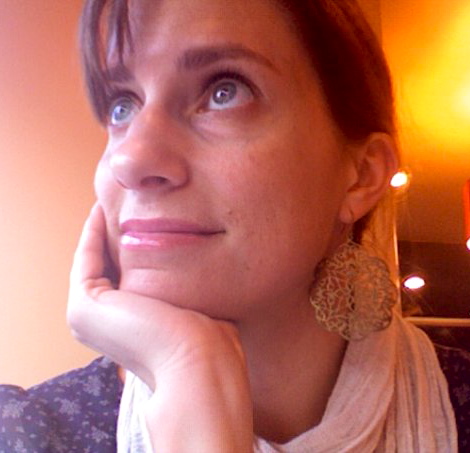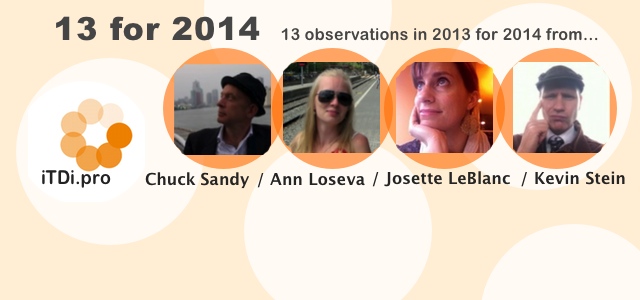
13 Quotes For A Happy New Year
– Chuck Sandy
I’ve long been a collector of quotes, and ever since finding a copy of From The Margins of A Grey Notebook by the poet and archivist Eric Sackhiem, I’ve always meant to keep a notebook full to the margins with them, just like he did.

Doing that is one of my resolutions for this year. Meanwhile, as I’m also a fan of acrostics and in awe of Jeffery Doonan’s recent An Acrostic For Professionalism on the iTDi Blog, I thought I’d try to pull together quotes I’ve collected on scraps of paper and turn them into an acrostic of my own for A Happy New Year.
All grown-ups were once children… but only few of them remember it”, wrote Antoine de Saint-Exupery in The Little Prince. He wasn’t, but very well could have been, writing to the teachers of young learners and all others, reminding them to remember what it’s like to learn in joyful ways and be full of awe about the world and its wonders. Think back. Take yourself there. Remember. Now, teach that way.
How we spend our days is, of course, how we spend our lives says Annie Dillard, and I’m grateful that I’ve gotten to spend my entire life as a learner and my entire adult life as a teacher. Now that I’m 55 with days no longer structured by class schedules and curricula, I realize even more how much each moment matters, how days add up, and then that’s it. How best to spend the days? It’s up to you to decide. Thank you for using this moment to read this post. When you finish, what will you do next, and why? What does it matter? What will you learn? How is that going to move you forward or enrich your now? Pause. Ponder. Do.
Always do what you are afraid to do, wrote Ralph Waldo Emerson in one of his essays, and though doing what scares us is never easy, it’s always worth doing. I tell myself this again and again. So often it’s fear that’s held me back from trying something new, making a change, taking a stand, and doing what’s right. But then, after leaping through a fear, I usually wind up amazed that I’ve neither fallen too far or too hard. When I have fallen far and hard, it’s been what I needed to do in order to stand up again in a new way. This year, take a risk. Step through fear. Leap.
Presence is far more intricate and rewarding an art than productivity wrote Maria Popova recently on Brainpickings on a day when I was offering a teacher advice on classroom management – a term I’ve never liked very much. The Popova quote helped me see that the greatest teachers I’ve had or observed are the ones who are wholly present for their students. They have no classroom management problems because in the classroom they are entirely there. How do they do that? I’m sure you know teachers like this. Ask them. When I’ve asked, I’ve found most have a learnable strategy for becoming and staying present in the classroom. Find one of these teachers, model their strategies, and then adapt and make them your own.
People are just as wonderful as sunsets if you let them be. When I look at a sunset, I don’t find myself saying, ‘Soften the orange a bit on the right hand corner.’ I don’t try to control a sunset. I watch with awe as it unfolds, wrote the psychologist Carl Rodgers in On Becoming A Person, and as I read that again I thought, “well, of course” but then cringed remembering how often I’ve worked to change people in various ways, not understanding that I was actually working to change myself through them. Being a teacher means accepting others as they are, while offering up tools that can take them farther, then as Rogers says, stepping back to watch in awe as they unfold to become even more who they are.
Your hand opens and closes, opens and closes, writes Rumi and the poem goes on to say “If it were always a fist or always stretched open, you would be paralyzed. Your deepest presence is in every small contracting and expanding, the two as beautifully balanced and coordinated as birds’ wings” and this is the best quote I know about the giving and receiving that is teaching and learning.
Never doubt that a small group of thoughtful, committed, citizens can change the world. Indeed, it is the only thing that ever has” said Margaret Mead and when we define world as one person, one classroom, or one community, we begin to realize the power we have as teachers to make a difference – especially when we band together though initiatives like iTDi to encourage and support each other.
Everybody is a genius, said Albert Einstein “but if you judge a fish by its ability to climb a tree, it will live its whole life believing that it is stupid,” so stop doing that. If it’s in you, take a stand against standardized testing. If you’re in the US, speak out about the Common Core. In every classroom, let people shine in the ways they do.
We don’t see things as they are, we see them as we are” wrote Anais Nin which goes to explain how our view of the same classroom over time changes as we change. It’s good to remember that what we see is just a reflection of who we are.
You have brains in your head. You have feet in your shoes. You can steer yourself any direction you choose. You’re on your own. And you know what you know. And YOU are the one who’ll decide where to go... wrote Dr. Suess, so just remember that.
Earth and sky, woods and fields, lakes and rivers, the mountain and the sea, are excellent schoolmasters, and teach some of us more than we can ever learn from books” wrote John Lubbock in a book that’s aptly titled The Pleasures Of Life and is available in digital form free. Just click the link, but before you do, go outside and have a look around. See what you can see and learn what you can learn.
And above all, watch with glittering eyes the whole world around you because the greatest secrets are always hidden in the most unlikely places. Those who don’t believe in magic will never find it wrote Roald Dahl in The Minpins, and this is an important thing to remember whether or not you’re a teacher, but especially if you are.
Remember that everyone you meet is afraid of something, loves something and has lost something, says H. Jackson Brown Jr. in Life’s Little Instruction Book, and this is a good thing to remember whenever you wonder why the people in your classrooms and all around you act the way they do and do the things they do. It’s because they’re people, just like you. My parents gave me Life’s Little Instruction Book one Christmas 30 years ago, and on that day I underlined this quote. Then, I put the book away and forgot about it. I would have been a better teacher as well as a better person all these years if I’d done a better job of remembering this simple truth: everyone you meet is afraid of something, loves something and has lost something. Still, it’s not too late, is it? There’s a whole year ahead, still a lot to learn, and though those 13 add up to A Happy New Year, there’s a postscript:
PS: The past is a foreign country: they do things differently there writes L.P. Hartley in The Go Between. It’s like T.S. Elliot says in Little Gidding: For last year’s words belong to last year’s language, and next year’s words await another voice. If there’s any looking back, it’s in silent gratitude. A year’s end marks a moment in the ineffable journey thru eternity, and not yet fluent in the language, all we can do is breathe in & breathe out grateful thanks as we speed past, and renew our commitment to becoming more fluent in kindness, more patient in our learning, more gentle in our teaching, and more able to be a conduit of the light that is love.
Let’s do that. I’ll be trying my wavery best.















